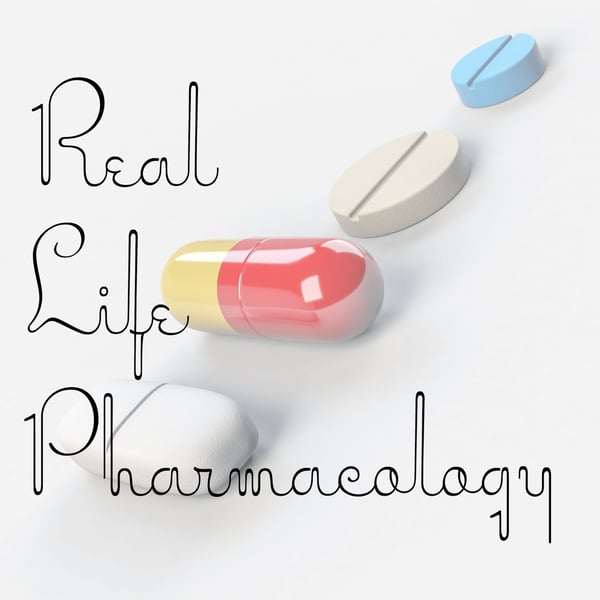Morphine Pharmacology
Real Life Pharmacology - Pharmacology Education for Health Care Professionals
Eric Christianson, PharmD; Pharmacology Expert and Clinical Pharmacist
5 • 716 Ratings
🗓️ 7 November 2019
⏱️ 14 minutes
🧾️ Download transcript
Summary
Morphine-6-glucuronide is the metabolite that can accumulate and cause CNS toxicity in renal failure.
Be aware of CNS depressants that may enhance the effect of morphine and other opioids. Some examples of CNS depressants include gabapentin, benzodiazepines, older antihistamine, skeletal muscle relaxants, and pregabalin.
Opioid withdrawal is a significant concern when patients have their morphine or another opioid abruptly stopped. Some signs of withdrawal include agitation, mood swings, anxiety, sweating, GI upset, pain, and insomnia.
Transcript
Click on a timestamp to play from that location
| 0:00.0 | Hey all, welcome back to the Real Life Pharmacology podcast. |
| 0:03.7 | I am your host, Eric Christensen, pharmacist. |
| 0:06.5 | And you can track me down at real lifepharmacology.com. |
| 0:11.0 | Shoot me an email there. |
| 0:12.6 | Also, you can track me down on LinkedIn as well, where I am fairly active there as well. |
| 0:20.1 | So today I'm going to cover morphine, |
| 0:23.1 | which is surprisingly a drug I have not covered specifically yet. |
| 0:29.1 | So I definitely wanted to do that. |
| 0:32.1 | Brand names of morphine, Acadian, Roxanol, MS. Cotton, there are a bunch of different brand names for morphine. |
| 0:42.9 | So if you do see a brand name that you're not sure of, definitely a good time to go ahead and |
| 0:49.0 | look at that, look it up, and make sure you know what you're talking about there. |
| 0:54.2 | So one of the really unique things about morphine is it's really considered a gold standard |
| 1:02.0 | opioid as far as dose conversions go. |
| 1:06.5 | And one of the unique reasons why it's like that is because there are so many dosage forms of morphine. |
| 1:14.6 | So we've got, you know, oral immediate release, we've got extended release, we can give morphine IV, we can do epidural, intrathecal administration. |
| 1:26.1 | We've got oral liquid formulations, suppository formulations. |
| 1:32.3 | I think you kind of get the point there. |
| 1:34.3 | There's a ton of different ways morphine can be administered, |
| 1:39.3 | and in the geriatric arena, this is definitely |
| 1:43.3 | advantageous in our hospice-type population, |
| 1:47.9 | where we may not necessarily always be able to easily give somebody an oral tablet, for example. |
| 1:56.3 | So that is definitely one nice thing about morphine in our hospice type population that may have |
... |
Transcript will be available on the free plan in -1970 days. Upgrade to see the full transcript now.
Disclaimer: The podcast and artwork embedded on this page are from Eric Christianson, PharmD; Pharmacology Expert and Clinical Pharmacist, and are the property of its owner and not affiliated with or endorsed by Tapesearch.
Generated transcripts are the property of Eric Christianson, PharmD; Pharmacology Expert and Clinical Pharmacist and are distributed freely under the Fair Use doctrine. Transcripts generated by Tapesearch are not guaranteed to be accurate.
Copyright © Tapesearch 2025.

